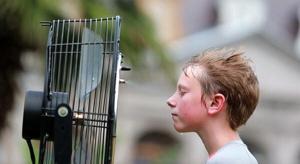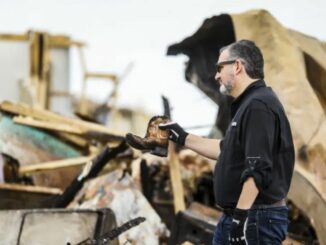
Heat indexes have soared past 110 degrees in Baton Rouge, taxing air conditoning units to their limit — and the people who repair them are working overtime.
“It’s been unbelievably busy,” said Dan Weimer, owner of Capital City Comfort Heating and Air Conditioning. “Everything has switched from a typical repair call to an emergency repair call because of the heat.”
It’s no wonder.
The National Weather Service in Slidell issued an excessive heat warning for Thursday and Friday. Temperatures climbed to 100F, while heat indexes — often described as ‘how hot it feels’ hovered between 115 and 120 degrees.
Danielle Manning, a forecaster with the weather service, said the agency issued its first heat advisory for Baton Rouge on June 14. Since then, there’s been five days with heat advisories and six days with excessive heat warnings, she said.
Heat advisories are issued when the heat index is expected to be 108 or above.
The other category, an excessive heat warning, is for days when the heat index will be in the range of 112 and above.
“All the air-conditioning systems are struggling to keep up,” said Jeremy Sigur, a service technician with Glaze Heating and Air in Gonzales.
“I’m working 12 to 14 hour days and going up into 130 F to 140 F in the attic,” he said. “The customers help me stay hydrated, and I take breaks.”
What to do if your A/C goes out
It’s not always the case, Sigur said, but most times the best thing to do when the air-conditioner isn’t working is to turn it off. Otherwise, the inside unit, the coil, is going to freeze up and the technician won’t be able to work on it for several hours.
“An air-conditioner is only designed for a 20 degree difference from the outside temperature,” said Mardrel Pack, owner of Pack HVAC Services in Baton Rouge. “It’s going to struggle.”
Pack said he had a recent call from a homeowner who was worried because the temperature in the house was staying in the 76 F to 78 F range.
“I told her she needed to bring the thermostat up to 78 degrees, let the sun come down, then slowly lower the thermostat,” he said.
A technician went out anyway, at the customer’s request, and did a little maintenance on the unit.
“She was fine,” Pack said.
But the repair shops said they’re responding to emergency calls as well, for the elderly and families with young children and for businesses that can’t stay open without air-conditioning.
“Some people call in just to say it’s cooling, but not keeping up,” said Weimer with Capital City Comfort. “Thats not an uncommon problem right now with the extreme heat. We get to those customers as quickly as possible, but right now, if its 95 degrees in someone’s home, they take priority.”
A/C repair shops says that keeping up an air-conditioner’s outside unit, with regular maintenance, and changing the filter inside the house pays off.
“Ninety percent of the people we do maintenance for, don’t have problems in the summertime,” Pack said.
Entergy has some recommendations for keeping the house cool and also saving on utility bills.
- Change air filters. Air filters on some air conditioning units require monthly cleaning or replacing.
- Setting the thermostat to 78 degrees or the highest comfortable temperature. Every degree lower than 78 can raise a bill as much as 3%.
- Buy a programmable thermostat. A programmable thermostat can help manage costs, is controllable, and can help monitor usage.
- Use fans to cool off. Ceiling fans, box fans and oscillating fans use very little electricity to circulate the air. Make sure ceiling fans are rotating in the right direction – counter-clockwise during summer – to push cooler air down into the room. Be sure to turn all fans off in unused rooms.
- Close blinds, shades and curtains to keep the sun out and the cool air in. Also, close air conditioning vents in rooms that are not in use.
- Seal cracks and holes around doors, windows and ductwork. Weather stripping and caulk will help keep the cold air in and the hot air out.


Leave a Reply